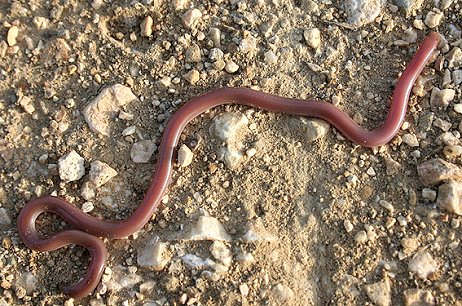|
|
Crvolika sljeparica |
Typhlops vermicularis |
Worm Snake |
|
|||
|
|
|
|
|||||
|
GDJE: Dugi Otok (?) Iako nalaz jest objavljen, postoje jake indicije da je rije?o pogrešnom pripisivanju uzorka lokalitetu na D. Otoku. Stoga postojanje te vrste na području RH ostaje upitnim. |
Opis:
|
Description: |
WHERE: Dugi Otok (?) Although the finding was published, there are strong indications that the specimen was attributed to the wrong location. Therefor the presence of this species in Cro remains uncertain. |
||||
|
|
Br. ljusaka: 21-24 leđnih. |
Scale count: 21-24 accross mid body. |
|
||||
|
Stanište: Uglavnom živi pod zemljom u suhim, vrućim područjima bez neke guste vegetacije. Češće travnata polja i padine sa raštrkanim kamenjem, ali nekada se mogu naći i na golijem terenu, nekad i bliže moru. Često se nađe u proljeće ispod kamenja koje je napola u zemlji, ali po ljeti se povlači dublje pod zemlju zbog vrućine. Živi u uskim hodnicima (npr. od kišne gliste) u koje se brzo povlači kad ju se uznemiri. Povremeno se pojavi na površini u sumrak ili za vlažnog vremena, rijeđe preko dana. |
Habitat: Mostly it lives underground in dry, hot places without dense vegetation. More often in grassy fields and slopes with scateres rocks, but sometimes they can be found in less vegetated areas, sometimes closer to the sea. Often found in Spring under rocks that are half-sunken into the ground, in summer retreats deeper underground because of the heat. Lives in narrow burrows (i.e. those of an earthworm) in which it retreats quickly if disturbed. Sometimes found on the surface at twilight or in humid weather, rarely during the day. |
||||||
|
Prehrana: Uglavnom se prehranjuje malim beskralježnjacima (mravi i njihove larve, mali pauci, štrige, kornjaši i cvrčci/skakavci). |
Food: Mostly feeds on invertebrates (ants and their larvae, small spiders, centipedes, beetles and crickets). |
||||||
|
Razmnožavanje: Ženke polažu 4-8 žućkasto-bijelih izduženih jaja sa zašiljenim vrhovima (11-25 mm duga). |
Reproduction: Females lay 4-8 yellowish-white eggs with pointed ends (11-25 mm long). |
||||||
